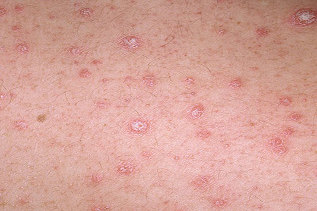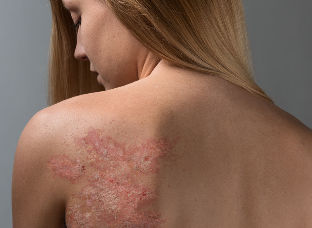
Psoriasis affects about 4% of the world's population. It can develop at any age from birth to old age, however, most of the psoriasis "love" of young people. The fact that 70% of the patients of psoriasis in children of 20 years.
The symptoms of psoriasis: itching, rash, peeling of the
Who to turn to: the doctor dermatologist
Analysis of the survey: the biopsy of the skin
Methods of treatment: cryotherapy, puva-therapy, plasmapheresis
Psoriasis is a disease chronic non-infectious disease, which often manifests itself in the form of rashes and peeling of the skin.
Psoriasis affects about 4% of the world's population. It can develop at any age from birth to old age, however, most of the psoriasis "love" of young people. The fact that 70% of the patients of psoriasis in children of 20 years.
If the skin appeared a rash, reminiscent of psoriasis – you should consult a dermatologist. The eruptions are peeling spicy plates of different sizes. When the plaques of psoriasis can be found on the elbows, knees, scalp, or other parts of the body. The doctor can make an accurate diagnosis and, in terms of its form, a treatment.
Causes of psoriasis
Psoriasis is an abnormal reaction of the organism to external stimuli, which in some sections of the body of the top layer of the skin fades away much faster than normal. If you normally cycle of division and maturation of cells of the skin occurs in 3-4 weeks, when the psoriasis this process is carried out to only 4 or 5 days.
Currently, psoriasis is considered to be hereditary multifactorialnyh of the disease: the disease is not one but a complex of causes immunological changes, the metabolism, and associated endocrine and neurological disorders. In this case we can say that: psoriasis — noninfectious, and that means do not contagious disease.
Causes of psoriasis up to now, have not eventually found. In this sense, several theories exist.
One of the theories, there are two types of psoriasis:
• Psoriasis type I is called transmissible by inheritance to failures of the immune system. This form of psoriasis affects about 65% of the people, and the disease manifests itself at an early age, from 18 to 25 years.• Psoriasis type II occurs in people over 40 years of age. With this type of psoriasis is not transmitted by inheritance, and is not related to faults in the cells of the immune system. But unlike the psoriasis type I, that you prefer the skin, psoriasis, type II more often affects the nails and joints.
According to another theory, the cause of psoriasis are exclusively of the infringement of the immunity, caused by several factors: this can be the stress or infectious disease, or cold, or bad food. For example, it has been noted that alcohol can cause the worsening of psoriasis — this applies especially to beer, champagne, alcoholic beverages. The consumption of products that contain vinegar, pepper, chocolate, and also worsens the course of the disease, and can cause a worsening of psoriasis. According to this theory, psoriasis is a systemic disease. This means that if a of serious violations in the functioning of the immune system, the process can spread to other organs and tissues, for example, in the joints. Consequently, you can develop psoriatricheskii of arthritis, which is a feature of the defeat of small joints of hands and feet.
The symptoms of psoriasis

The symptoms of psoriasis are inflamed, peeling red spots accompanied by itching. Such spots (plaque) are often placed on the skin of the scalp, the knees and the joints,* in the lower part of the back and in the areas of the folds of the skin . Around the fourth part of the sick of the involvement of the nails.
In function of the seasonality of recurrence (worsening of disease) distinguish three types of psoriasis: winter, summer, undefined. More common in the winter type of psoriasis.
In the period of exacerbation of the manifestations of psoriasis in the hands, the knees, the head, and in the lower part of the back and in the areas of the folds of the skin act in the form of plates, of a reddish colour. Their dimensions vary from pin head to large surface the size of the palm of the hand, and more.
The rashes are usually accompanied by flaking and itchy painful. In the process of shedding surface of the flakes are more dense and located at the bottom (hence its second name of psoriasis — flake versicolor). Sometimes, in the area of the affected areas of the skin to produce cracks and suppuration.
For progressive of psoriasis characterized by the so-called phenomenon of the Kebnera: the development of platelets at the sites of wounds or scratches in the skin.
Around the fourth part of the sick of the involvement of the nails. To do this, we generate maps of deepening and stained fingernails of the disks. In addition, the nails may utolzhatsya and crumble.
In summer, under the influence of the solar rays, to the sick of winter in the form of the symptoms of psoriasis are weakened, and sometimes do not disappear. The sick summer form of psoriasis, on the contrary, it is recommended to avoid exposure to the sun, since that worsens the disease course.
The diagnosis of psoriasis
Diagnosed psoriasis, the doctor dermatologist. To him should I do if it appears in the skin, a rash similar to a psoriatic — plaques size, red, pastas, and peeling. To clarify the diagnosis may require a biopsy of the skin.
The treatment of psoriasis
If the doctor has revealed psoriasis in the initial phase, it is very possible that you are mainly preventive and not curative of the tool.
When the major manifestations of the disease, apply the following methods of treatment of psoriasis:
• cryotherapy is a method of holodovogo of impact;• plasmapheresis - purification of the blood;
• ultraviolet light therapy — the treatment consists in the short-term in the similar procedures with access to the terrace. For greater effectiveness in the treatment of psoriasis, this method is often combined with the reception of the special medications of puva therapy).
In any case, do not try to practice the psoriasis treatment of ultraviolet light without the guidance of a physician. When the psoriasis is a small dose of ultraviolet light are medicinal, and high — on the contrary, can podhlestnut the development of the disease. The same applies to the solar baths.
Unfortunately, until now no one knows how to cure psoriasis completely, as the body keeps memory" of the disease in the form of biochemical, immunological and functional changes. The relapse of psoriasis can occur at any time, therefore, patients with the same diagnosis, it is always necessary to experience a dermatologist.























